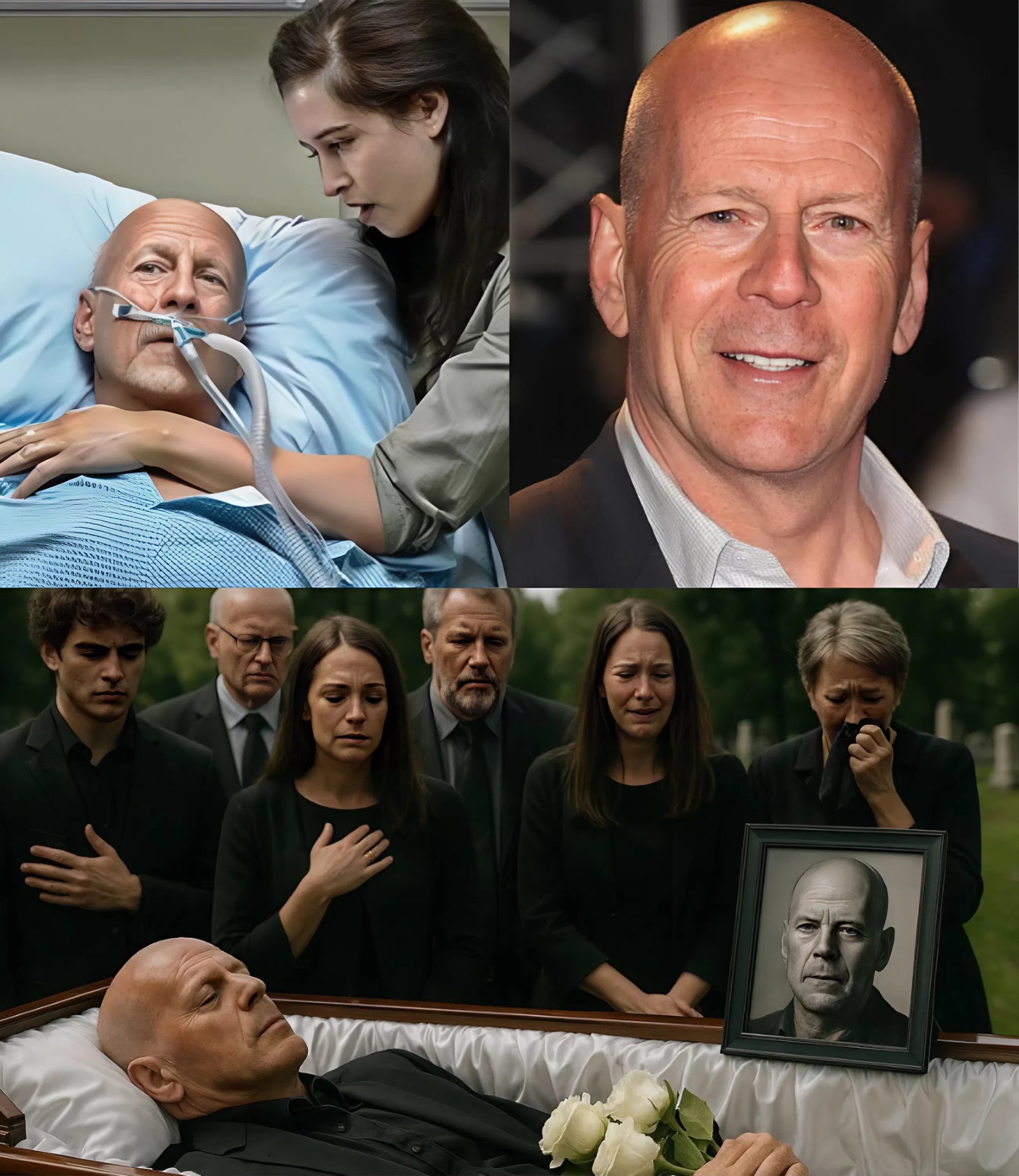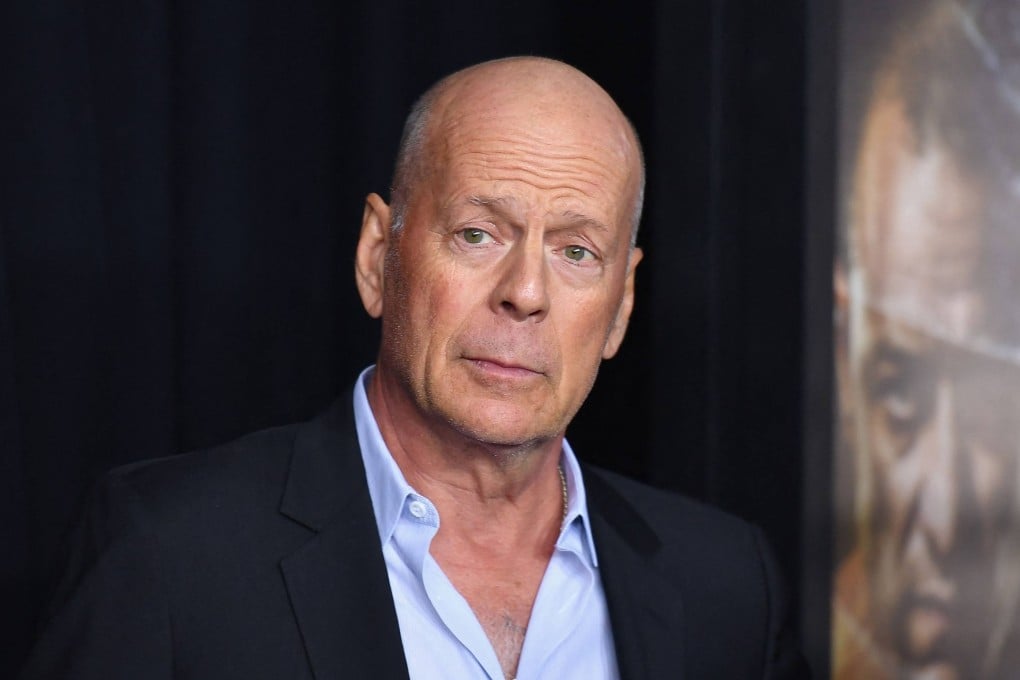Tonight, Hollywood holds its breath. The lights of Los Angeles seem dimmer, the red carpets quieter, and millions of hearts across the world are aching with disbelief. The news no one ever wanted to hear has finally been confirmed: Bruce Willis — the action hero who made the impossible seem human, who fought villains and fate with equal courage — has reached the final chapter of his long, heartbreaking battle with frontotemporal dementia.
For decades, he was the man who laughed in the face of chaos, who bled, who broke, and who always got back up. But this time, the world watches helplessly as the man who taught us what it meant to be unbreakable slowly slips away — not to an explosion, not to a gunfight, but to the quiet, cruel erasure of memory itself.
A Hero’s Fall: The Final Update That Shook the World
The announcement came quietly through the family’s statement late Tuesday night. Simple, sincere, and shattering:

“Bruce’s condition has advanced. He’s surrounded by love, and though he can no longer speak or recognize those closest to him, his spirit remains with us.”
Buy vitamins and supplements
Those words echoed across the world — not as a headline, but as a heartbreak. Fans who grew up with Die Hard, who quoted “Yippee-ki-yay” as a badge of toughness, suddenly felt the fragility of time itself. For many, Bruce Willis wasn’t just an actor; he was the face of perseverance — the man who never quit, no matter the odds.
For many, Bruce Willis wasn’t just an actor; he was the face of perseverance — the man who never quit, no matter the odds.
And now, life has written him a script even John McClane couldn’t fight his way out of.
The Man Behind the Myth
Bruce Willis wasn’t born a Hollywood powerhouse. He came from humble beginnings — a working-class boy from New Jersey who once stuttered so badly he could barely speak. Acting, ironically, became his salvation. On stage, he found a rhythm where his stutter disappeared, replaced by a sharp wit and fearless confidence that would later define his screen presence.
Before the world knew him as the wisecracking cop of Die Hard, he was David Addison on Moonlighting — a charming, sarcastic detective who mixed humor and depth in ways television had never seen. Willis blurred the lines between comedy and drama, vulnerability and strength. He made masculinity human.
When Die Hard exploded onto screens in 1988, it didn’t just make him a star — it changed cinema forever. At a time when action heroes were muscle machines, Bruce Willis gave audiences something new: a man who could hurt, cry, bleed, and still fight on. He wasn’t perfect. He was us — flawed, scared, determined.
That was Bruce’s magic. He made every man believe he could be a hero.
The Long, Silent Battle
The first whispers came in early 2022. Rumors circulated that Willis was struggling on film sets — forgetting lines, appearing disoriented, unable to follow direction. Then came the heartbreaking confirmation: he was diagnosed with aphasia, a condition that affects speech and comprehension. Within months, his family revealed that the underlying cause was frontotemporal dementia — a rare and aggressive disease that attacks the brain’s frontal and temporal lobes, stealing personality, behavior, and communication.

From that moment, Bruce Willis — the man who once commanded explosions and chaos — began a different kind of battle. One without scripts, without cameras, without victories.
Emma Heming Willis, his wife, became the family’s voice. In interviews and social media posts, she showed grace that mirrored Bruce’s quiet strength. “Dementia is cruel,” she once said, “but love can still live in silence.” Her words resonated with millions who’ve faced the same invisible war — watching someone you love disappear while their body remains.
Even Demi Moore, his ex-wife and lifelong friend, stood by him. Their blended family — an image once rare in Hollywood — became a portrait of loyalty, compassion, and shared pain. Together, they navigated the impossible: preparing to say goodbye to a man who was still physically there.
Hollywood Reacts: A Legacy Larger Than the Screen
As the news broke, tributes poured in from every corner of the entertainment world. Directors, actors, and crew members remembered not the superstar, but the man. Quentin Tarantino called him “a cinematic poet of pain.” M. Night Shyamalan, who directed him in The Sixth Sense and Unbreakable, wrote, “He gave silence a voice. Even in stillness, he spoke volumes.”
Samuel L. Jackson, his Pulp Fiction co-star, shared:
“Bruce was real. He wasn’t acting like a hero — he was one. Tough, funny, kind, stubborn. He changed what we thought a leading man could be.”
Even those who never met him felt compelled to speak. Dwayne Johnson posted:
“He showed us you don’t need capes to be a hero. You just need courage.”
For fans, the grief was deeply personal. Across forums and timelines, thousands shared stories of growing up watching Willis save hostages, defy villains, or whisper “I see dead people.” The common thread was clear: Bruce Willis wasn’t just in our movies — he was in our memories.
The Man Who Made Vulnerability Masculine
In an age of superheroes and CGI, Bruce Willis’s legacy feels even more profound. He built his empire on imperfection. His characters bled, sweated, and failed — but they never gave up. He made fear look brave.

When John McClane limped barefoot across broken glass, audiences didn’t just see pain — they saw humanity. And that humanity became his signature. Unlike Stallone’s sculpted warriors or Schwarzenegger’s iron fists, Willis’s heroes were everyday men thrust into extraordinary circumstances. That relatability made him timeless.
Even in later years, when his films shifted to quieter roles — from the introspective The Sixth Sense to the haunting Twelve Monkeys — he continued to explore vulnerability. Beneath every smirk was melancholy; beneath every line of humor, an ache. That duality defined his art — and now, it defines his legacy.
The Cruel Irony of Silence
Perhaps the most tragic twist in Bruce Willis’s story is that the disease that silenced him attacked the very thing that made him legendary: his voice. That gravelly, iconic tone — the one that could deliver sarcasm, sincerity, or rage in a single breath — is now lost to the world.
But even in silence, he continues to speak through those who love him. Emma’s social media posts show family moments — quiet walks, shared laughter, the small grace of presence. There are no Hollywood spotlights now, only sunlight through curtains, hands held, hearts broken yet still beating.
It’s a reminder that behind the legend was always a man — a husband, a father, a friend. And in this final act, he’s teaching the world something his movies never could: that courage isn’t just found in explosions, but in enduring love, even when words fade away.
A Legacy That Outlives the Body
When the history of cinema is written, Bruce Willis’s name will stand not merely as an actor, but as a symbol — of transformation, authenticity, and strength through suffering. He didn’t just perform characters; he embodied values.
His career spans over four decades, more than 100 films, and countless memories. Yet beyond the box office numbers and critical acclaim lies something far more lasting — an emotional truth that transcends film reels.
He showed the world that heroes can cry, that laughter can coexist with loss, and that resilience is not about invincibility, but persistence.
As one fan poignantly wrote online:
“Bruce Willis taught us to fight, and now he’s teaching us how to let go.”
Farewell, But Never Forgotten
As the world says goodbye, it’s hard to find closure — because how do you say farewell to a man whose face, voice, and energy shaped an entire generation of cinema?
Maybe we don’t. Maybe we simply carry him forward — in the echoes of every Die Hard Christmas marathon, in every sarcastic one-liner uttered during hard times, in every ordinary person who keeps fighting long after they should’ve fallen.
Bruce Willis gave us a kind of heroism that wasn’t about perfection, but perseverance. And that is something no disease can take away.
So tonight, as Hollywood dims its lights, the world whispers one last salute:
“Yippee-ki-yay, Bruce.”
The hero rides into the sunset — not defeated, but immortal.




